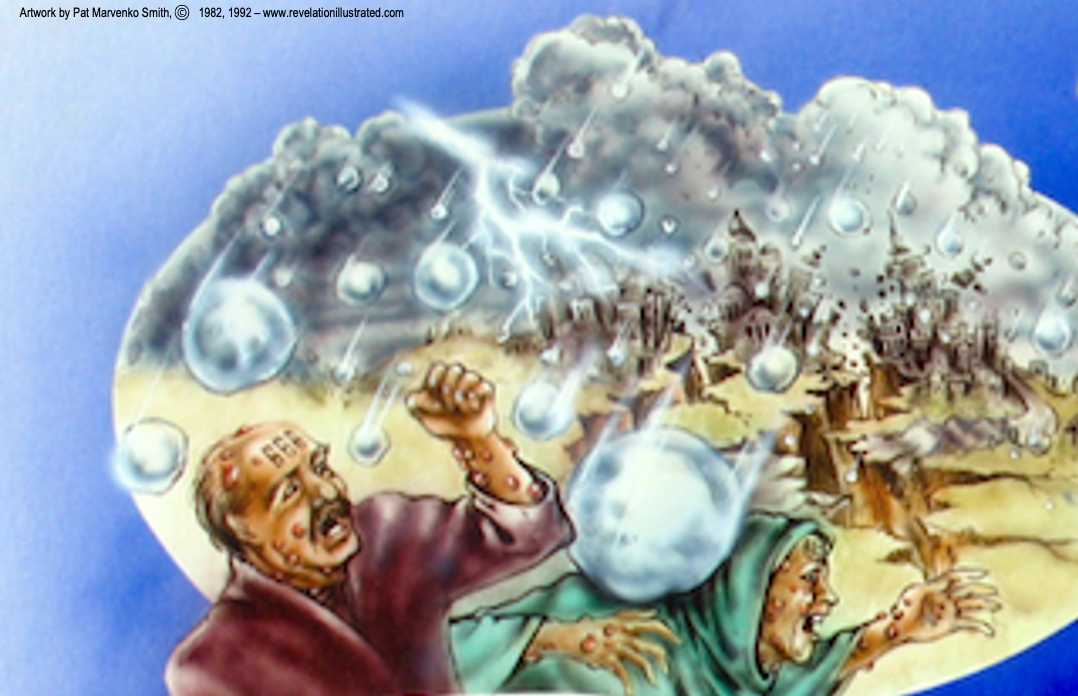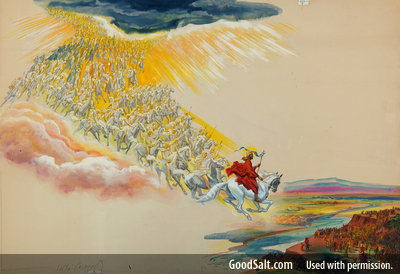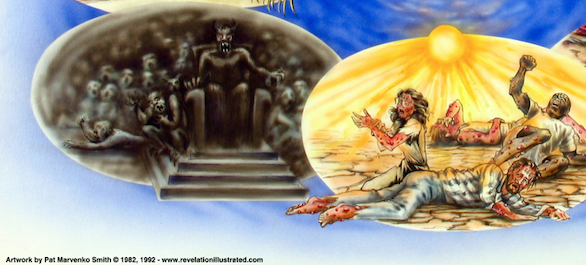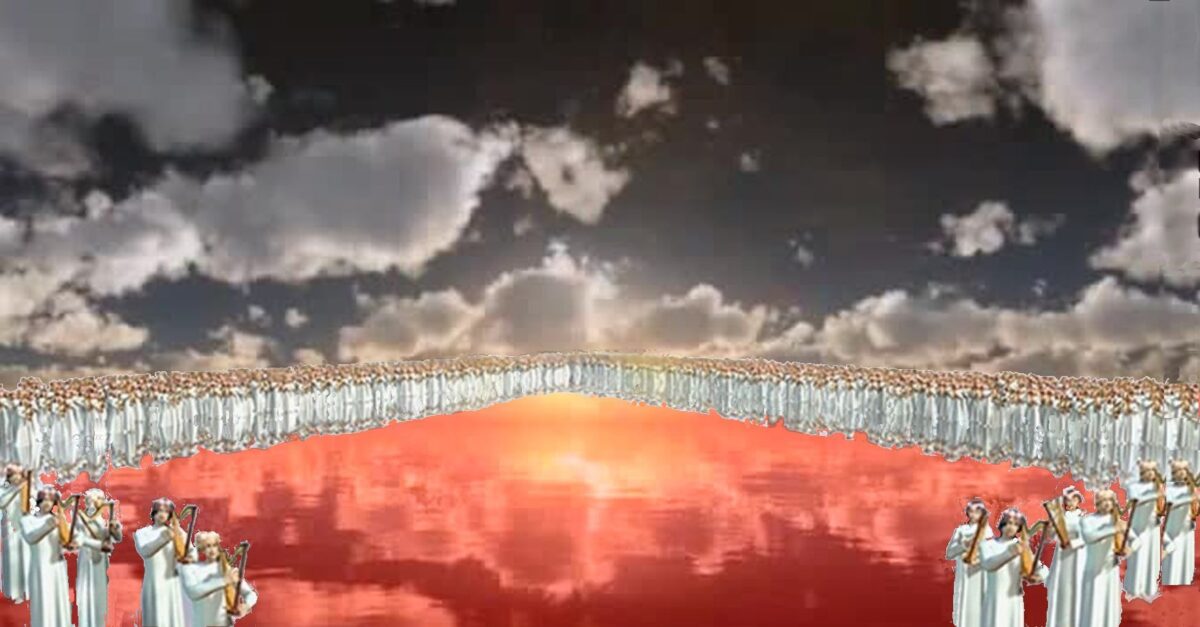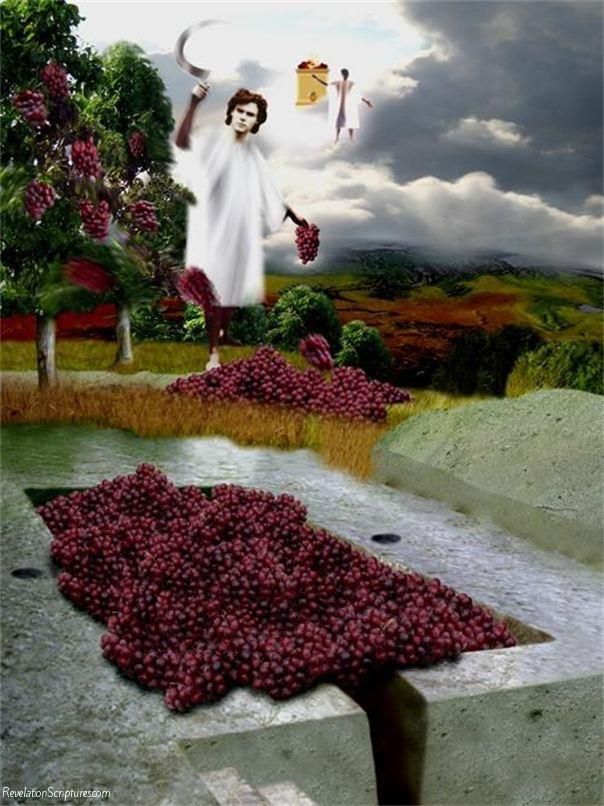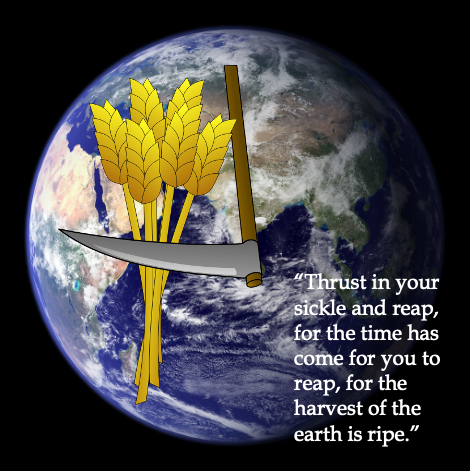“And men were scorched with great heat, and they blasphemed the name of God who has power over these plagues; and they did not repent and give Him glory.” Revelation 16:9
After the inhabitants of heaven praise God for His righteous and just judgments toward rebellious humankind who shed the blood of His servants (16:5-7), the fourth angel arrives to pour out his bowl of wrath. Instead of the beast-worshippers on the earth receiving a much-needed drink of rainwater to quench their parched throats, they got the exact opposite. “8 Then the fourth angel poured out his bowl on the sun, and power was given to him to scorch men with fire. 9 And men were scorched with great heat, and they blasphemed the name of God who has power over these plagues; and they did not repent and give Him glory.” (Revelation 16:8-9). The definite article before “men” (tous anthrōpous) refers specifically to those whose allegiance was to the Beast (cf. 16:2). It is possible that those who refused to worship the Beast and receive his mark were not struck with this judgment. Likewise, the Israelites also escaped some of the plagues on Egypt’s land, water, animals, people, leaders, and even Pharaoh (Exodus 8:20-9:7; 9:13-35; 10:21-12:36). 1
This “fourth… bowl” judgment used “the sun” to “scorch men” who followed the Beast “with fire” and “great heat” that will leave their human flesh charred. This was “more than an oppressive heat wave that weakens and withers people, this judgment will involve the blistering and charring of human flesh by the sun.” 2
Swindoll writes, “Instead of catching soothing drops of rain, the people of earth were burned with searing rays from the sun! Scientists have long been concerned about the possibility of massive, unexpected solar flares, which could increase the number of harmful rays that penetrate our atmosphere. It seems that by the end of the Tribulation, the atmosphere will have been so damaged that the rays of the sun will no longer be filtered or deflected, causing all sorts of catastrophic climatic changes. This end-times global warming will make today’s hot-earth hysteria resemble nothing more than a warm spring day.” 3
One would think that after all these horrific judgments on the earth that left people painfully afflicted, starving, dying of thirst, and severely burned, that humankind would fall to their knees and beg God for His mercy, right!?! Wrong!!! “And men were scorched with great heat, and they blasphemed the name of God who has power over these plagues; and they did not repent and give Him glory.” (Revelation 16:9). Instead of turning to the Lord in repentance and giving “Him glory,” they “blasphemed the name of God who has power over these plagues.” Instead of letting the scorching sun melt their hearts, they let it harden their hearts toward God, much like Pharaoh hardened his heart after each of the plagues on Egypt.
Surely a loving God would relent of His judgments if people sought to get right with Him. The prophet Joel addresses this part of God’s character when he writes, 4 “’12 Now, therefore,’ says the Lord, ‘Turn to Me with all your heart, with fasting, with weeping, and with mourning. 13 So rend your heart, and not your garments; return to the Lord your God, for He is gracious and merciful, slow to anger, and of great kindness; and He relents from doing harm. 14 Who knows if He will turn and relent, and leave a blessing behind Him— a grain offering and a drink offering for the Lord your God?” (Joel 2:12-14).
Instead of humbly repenting before the Lord God Whom they know has the power over these plagues to lovingly bring them to a stop, the people of the earth increased the hardness of their hearts during the last part of the Tribulation. Why? Because they have taken on the character of the Beast who blasphemes God and indoctrinates the citizens of his worldwide kingdom to do the same (Revelation 13:1, 5-6; 17:3; cf. Daniel 11:36; 2 Thessalonians 2:3-10). Instead of blaming their own sinfulness for these first four plagues, they blame God for them. 5
The first four bowl judgments targeted the natural realm (the earth, sea, fresh waters, and the sun), but the next two bowl judgments target the Beast and his worldwide kingdom. “Then the fifth angel poured out his bowl on the throne of the beast, and his kingdom became full of darkness; and they gnawed their tongues because of the pain.” (Revelation 16:10). The fifth bowlof God’s wrath was “poured out… on the throne of the beast and his kingdom.” Since the beast’s kingdom was worldwide,this was a global darkness that will cause such intense emotional anguish that beast-worshippers will engage in self-mutilation (“they gnawed their tongues because of the pain”). 6
This darkness is reminiscent of the plague God brought upon Egypt. “21 Then the Lord said to Moses, ‘Stretch out your hand toward heaven, that there may be darkness over the land of Egypt, darkness which may even be felt.’ 22 So Moses stretched out his hand toward heaven, and there was thick darkness in all the land of Egypt three days. 23 They did not see one another; nor did anyone rise from his place for three days. But all the children of Israel had light in their dwellings.” (Exodus 10:21-23). This darkness in Egypt was so deep, oppressive, and complete, that the Egyptians did nothing during those three days.The chaos caused by the darkness in Egypt may explain the intense pain this global darkness will cause to the citizens of the Beast’s kingdom during the Tribulation period.
Keep in mind that the effects of these first five bowl judgments are cumulative. “The sores brought on by the first bowl will continue to fester as the darkness closes in around them. The water that would have soothed their sun-scorched flesh will stand in stinking, stagnant pools; once-clean water will be polluted with decaying blood.” 7
Nevertheless, people will still refuse to humble themselves before the God Who could bring a stop to these severe bowl judgments. “They blasphemed the God of heaven because of their pains and their sores, and did not repent of their deeds.” (Revelation 16:11). Instead of blaming their rebellious ways for these plagues, the followers of the Beast choose to blaspheme God for “their pains and their sores.” But they don’t stop there. They choose to abide in their wicked ways that caused them to be oppressed by these horrific plagues – they do “not repent of their deeds.” 8
“As in 16:9, this scene is reminiscent of a child cursing his parent while he is being spanked. Such a reaction to punishment inevitably triggers more punishment.” 9
We have learned in our study of the seven-year Tribulation on earth in the book of Revelation, that this will be a time that is filled with heightened deception (12:9; 13:14; 18:23; 19:20). One of Satan’s oldest strategies which will be implemented in full during the Tribulation is to blame God for all the pain that exists in the world to deceive people into thinking that the true God is an out of control, vengeful deity who can be defeated if everyone comes together to fight against Him. The truth is pain and suffering did not exist in the world God created (Genesis 1-2). Pain and suffering were the result of Satan, who sinned first against God (Isaiah 14:12-15; Ezekiel 28:12-19), tempting Adam and Eve to sin (Genesis 3:1-6) which resulted in sin and death entering the entire world (Romans 5:12). The effects of sin will culminate in the Tribulation period when humanity’s rebellion against God will reach an all-time depth of depravity resulting in God’s in-kind judgment (Revelation 6-16).
When we look back at the chaos and pain the global pandemic has caused the past two years, do we blame God for this? Or when we observe the loss of innocent lives during the Russia-Ukraine conflict, do we shake our fists at God and hold Him responsible for this? How do we respond to God when we or those close to us experience suffering and pain? Do we harden or humble our hearts toward the Lord?
Satan wants to convince us that God is to blame for all our problems and pain so we will not come to the Lord in faith and be saved forever from Satan’s destiny in the lake of fire (Matthew 25:41; Revelation 20:10). Please understand that God is the One Who loves us, not Satan. Satan doesn’t care about you or me. He knows his destiny is in the lake of fire and he selfishly wants to take as many people with him as possible. He will go to any length of deception to help populate hell. He has no guilt or shame for his actions because he is evil to the core.
But Jesus Christ is selfless to the core. Instead of holding on to His glory in heaven, He veiled His glory with human flesh when He left heaven and came to earth knowing He would be rejected by the world and His own Jewish people who would condemn Him to die on a cross (Philippians 2:6-8). The Bible tells us, “9 God showed how much He loved us by sending His one and only Son into the world so that we might have eternal life through Him. 10 This is real love—not that we loved God, but that He loved us and sent His Son as a sacrifice to take away our sins.” (I John 4:9-10 NLT). “Real love” gives instead of takes. God’s love gave His best (His Son) when we were at our worst (in bondage to our sins) so we “might have eternal life through” Jesus if we would do one thing: BELIEVE IN HIM.
Jesus said, “He who believes in Me has everlasting life.” (John 6:47). The word “believe” in the New Testament means to be persuaded that something is true and then trust or depend upon. Do you believe Jesus was speaking the truth when He said, “He who believes in Me has everlasting life”? If so, do you now trust Christ (not your good life, religion, or prayers) to give you His gift of eternal life? If you do, Jesus guarantees you now have everlasting life which can never be taken away from you (John 10:28-29). God is now your Father in heaven, and you are His child forever (John 1:12; 6:35). Everyone who believes in Jesus for eternal life is your brother or sister in Christ.
Christ wants you to grow in your relationship with Him. Jesus said to those who believed Him, “If you abide in My word, you are My disciples indeed. And you shall know the truth, and the truth shall make you free.” (John 8:31b-32). The opposite of truth is falsehood or lies. Jesus wants you to “abide” or continue in His Word, the Bible, so you can “know the truth” which “shall make you free” from Satan’s lies that keep you enslaved to sin and shame. God’s truth will identify the lies you have been believing that have held you in bondage to sin and will also provide the remedy to overcome those lies. It is the truth of God’s Word that will break the shackles of Satan’s lies that have kept you from leaning into the Lord when you face pain and suffering.
Below are some examples of Satan’s lies that can keep us from drawing near to the Lord. I have included God’s truth to replace those lies and the Scriptures to go with them.Take some time to read through these lies and then identify the ones that you have believed to be true. The lie will feel true to you if you believe it. Then read the corresponding truth statements repeatedly until they feel true to you. As you do that the corresponding lies will feel less and less true. Ask the Lord Jesus to deliver you from bondage to these lies (cf. Psalm 119:28-29). We do not have the power in ourselves to overcome them, but Jesus Christ does. Let Him renew your mind as you meditate on God’s truth.
Lie: God is to blame for all your pain and suffering.
Truth: Pain and suffering were the result of Satan (who sinned first against God), tempting Adam and Eve to sin which resulted in sin and death entering the entire world.
Scripture: “Therefore, just as through one man sin entered the world, and death through sin, and thus death spread to all men, because all sinned.” Romans 5:12; cf. Genesis 3:1-6; Isaiah 14:12-15; Ezekiel 28:12-19.
Lie: God cannot be trusted.
Truth: God can be trusted because He is good and faithful to His promises.
Scripture: “Oh, taste and see that the Lord is good; blessed is the man who trusts in Him!” Psalm 34:8
“In hope of eternal life which God, who cannot lie, promised before time began.” Titus 1:2
Lie: God is holding out on you.
Truth: God wants to give you, His best.
Scripture: “The thief [Satan] does not come except to steal, and to kill, and to destroy. I [Jesus] have come that they may have life, and that they may have it more abundantly.” John 10:10
Lie: You can be like God by disobeying Him.
Truth: Since there is only one true God, and I am not Him, I must live in total dependence on Him.
Scripture: God said, “I am the Lord, and there is no other; there is no God besides Me.” Isaiah 45:5
“’But as for me, I trust in You, O Lord;’ I say, ‘You are my God.’ My times are in Your hand.’” Psalm 31:14-15
Lie: God is against me.
Truth: God is for me and not against me.
Scripture: “What then shall we say to these things? If God is for us, who can be against us?” Romans 8:31
Lie: God has or will accuse me.
Truth: God has declared me totally righteous in Christ.
Scripture: “Who shall bring a charge against God’s elect? It is God who justifies.” Romans 8:33
Lie: God has or will condemn me.
Truth: God will not condemn me because Christ took my condemnation on the cross and He now defends me and intercedes for me in heaven.
Scripture: “Who is he who condemns? It is Christ who died, and furthermore is also risen, who is even at the right hand of God, who also makes intercession for us.”
Lie: I am going to be separated from the love of Christ because I’m so unworthy.
Truth: No one and nothing can separate me from Christ’s love.
Scripture: “35 Who shall separate us from the love of Christ? Shall tribulation, or distress, or persecution, or famine, or nakedness, or peril, or sword?… 37 Yet in all these things we are more than conquerors through Him who loved us. 38 For I am persuaded that neither death nor life, nor angels nor principalities nor powers, nor things present nor things to come, 39 nor height nor depth, nor any other created thing, shall be able to separate us from the love of God which is in Christ Jesus our Lord.” Romans 8:35, 37-39
Lie: God would never love me as I am.
Truth: In Christ, I am totally loved by God as I am.
Scripture: “Long ago, even before He made the world, God chose us to be His very own through what Christ would do for us; He decided then to make us holy in His eyes, without a single fault—we who stand before Him covered with His love.” Ephesians 1:4 TLB
Lie: I am alone and unloved.
Truth: I am not alone or unloved. I am loved and cherished by the Creator of the Universe.
Scripture: “When my father and mother forsake me, then the Lord will take care of me.” Psalm 27:10
Lie: I could never be forgiven.
Truth: I am totally forgiven in Christ.
Scripture: “13 And you, being dead in your trespasses and the uncircumcision of your flesh, He has made alive together with Him, having forgiven you all trespasses, 14 having wiped out the handwriting of requirements that was against us, which was contrary to us. And He has taken it out of the way, having nailed it to the cross.” Colossians 2:13-14
Lie: I am an unacceptable person.
Truth: I am totally accepted in Christ.
Scripture: “There is therefore now no condemnation to those who are in Christ Jesus.” Romans 8:1a
“To the praise of the glory of His grace, by which He made us accepted in the Beloved.” Ephesians 1:6
Prayer: Lord Jesus, we come to You now realizing that we can be a lot like the people in the Tribulation period who will be deceived into blaming You for their suffering and pain instead of their own rebellion against You. When bad things happen to us, help us O Lord to humble our hearts before You instead of hardening them. Lord, we cannot overcome Satan’s lies on our own. The Devil wants to take as many people with him to hell as possible. He will go to any length of deception to populate the lake of fire. Lord, please make us the kind of people who will do whatever it takes within the boundaries You have given us to populate Your heaven through the preaching of the gospel of Jesus Christ. We desperately need You and Your Word to help us identify the lies we believe and replace them with Your truth so we can live the abundant life You came to give us. We pray for those whose hearts and minds have been deceived by Satan into believing You are responsible for all their pain and suffering. Help them to see that You love them and gave Your best for them when they were still undeserving sinners. And You want to save them forever from the lake of fire and give them eternal life if they would simply believe in You, Lord Jesus. Please use our lives and lips to communicate Your love to a lost and broken world so they can hear and believe the good news of Jesus’ gift of eternal life. In Your mighty name we pray, Lord Jesus. Amen.
ENDNOTES:
1. Tom Constable, Notes on Revelation, 2017 Edition, pg. 172.
2. Bob Vacendak; Robert Wilkin; J. Bond; Gary Derickson; Brad Doskocil; Zane Hodges; Dwight Hunt; Shawn Leach, The Grace New Testament Commentary: Revised Edition (Grace Evangelical Society, Kindle Edition, 2019), pg. 1559.
3. Charles R. Swindoll, Insights on Revelation (Swindoll’s Living Insights New Testament Commentary Book 15, Tyndale House Publishers, Inc., 2014 Kindle Edition), pp. 296-297.
4. Ibid., pg. 297.
5. Constable, pg. 172 cites Robert L. Thomas, Revelation 8-22: An Exegetical Commentary (Chicago: Moody Press, 1995), pg. 257.
6. Tony Evans, CSB Bibles by Holman, The Tony Evans Study Commentary (B & H Publishing Group, Kindle Edition 2019), pg. 2407.
7. Swindoll, pg. 298.
8. Vacendak, pg. 1559.
9. Evans, pg. 2409.

